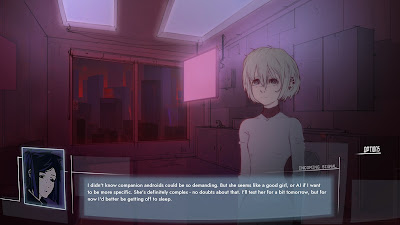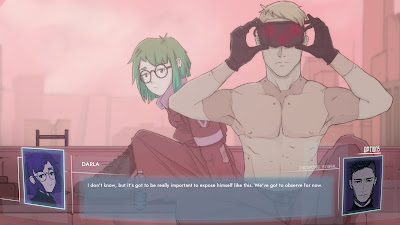Synergia is a visual novel that takes place in the future. Androids are commonplace, and the newest generation is practically indistinguishable from humans. It follows Cila, whose employment involves her being sent to situations where androids had gone haywire, creating a dangerous situation. Cila then diffuses the situation, mostly by interfacing with the android using the chip implant from her brain.
The game has a great atmosphere, from its red / crimson / pink themed shading to the music to its visual style. It sets the tone for the story and in particular, it helps communicates how Cila is currently feeling about her life, how it can be lonely or frustrating or bland. It doesn’t spend that much time to set up the world, we quickly learn about androids, their limitations and how prevalent they are in society.
The game has a great atmosphere, from its red / crimson / pink themed shading to the music to its visual style. It sets the tone for the story and in particular, it helps communicates how Cila is currently feeling about her life, how it can be lonely or frustrating or bland. It doesn’t spend that much time to set up the world, we quickly learn about androids, their limitations and how prevalent they are in society.
Despite initial assumptions, Cila actually works for a private organisation. Through tidbits within the dialogue, we learn how far technology has advanced, and how many people have gotten chip implants. Androids are commonplace and have advanced to a remarkable degree, bringing with them a set of problems. The biggest problems seem to be the older generation of androids although that may be a biased view given those are the ones that Cila are tasked to deal with the most.
Cila’s attitude towards android can be described as indifferent. She has her own android at home, but she acts as if she doesn’t care about it. Although we will see otherwise. Furthermore, thanks to the nature of her work, she is constantly in danger, physically since androids without restrictions or safety measures have superior strength, and mentally because Cila effectively creates a path or link to her brain when she interfaces with the androids in an attempt to communicate and shut them down.
A lot of Cila’s past is shrouded in mystery with constant hints and vague references so that the player gets most of it, but the game stops from outright stating it. It tries to touch on heavier philosophical themes, like feeling love with an android, but the execution feels clumsy and lacking. Furthermore, Cila naturally develops feelings for an android but it feels so sudden without the proper time beforehand to set it up properly.
The story holds a lot of potential, it constantly introduces new things about the world and its history of android development. Unfortunately, at the same time, because the length of the game is so short, it never gets the chance to explore these themes in any meaningful way. It’s forced to keep the plot chugging along, never being able to commit on either Cila’s personal story, or the bigger story that comprises of the chain of events involving Cila.
The game’s only gameplay elements are when choices pop up and you select one. These choices will dictate which of the two endings you get, a bad ending and a good ending. Both are okay, and just shows different potentials for the same events. The unfortunate part of the game is that it’s world is really interesting, especially towards the end when it reveals more, but it just never capitalises on that. Cila’s story is but only a small part of the world, so it feels at odds with each other. Like the game wanted to go bigger in scope but was forced to regulate that into the background while it followed Cila. As a result, the story feels uneven, rough and especially vague at times.
Once you have viewed the two endings, the epilogue unlocks, but takes place before the events of the story and expands on something mentioned by one of the characters. The game only takes around four hours to complete, less if you read fast and there are no other extras. Due to the short length and its rough storytelling, there are many more questions than answers. We’re given large slabs of exposition but they neglect to properly explain the motivations or spell out why something is important, we just get told they are.
Overall, Synergia is an average visual novel. It’s really good with its atmosphere thanks to its aesthetic and chilling music. It depicts the type of future it wants in a convincing way, and the red tinge seals the deal. In relation to its story, it starts off being intriguing and it introduces more and more elements of its world that continues to keep your interest. Unfortunately, it couldn’t provide a satisfactory plot arc or conclusion, as it’s basically a jumbled mess of good ideas that isn’t coherent enough to be great.
-------------------------------------------------








